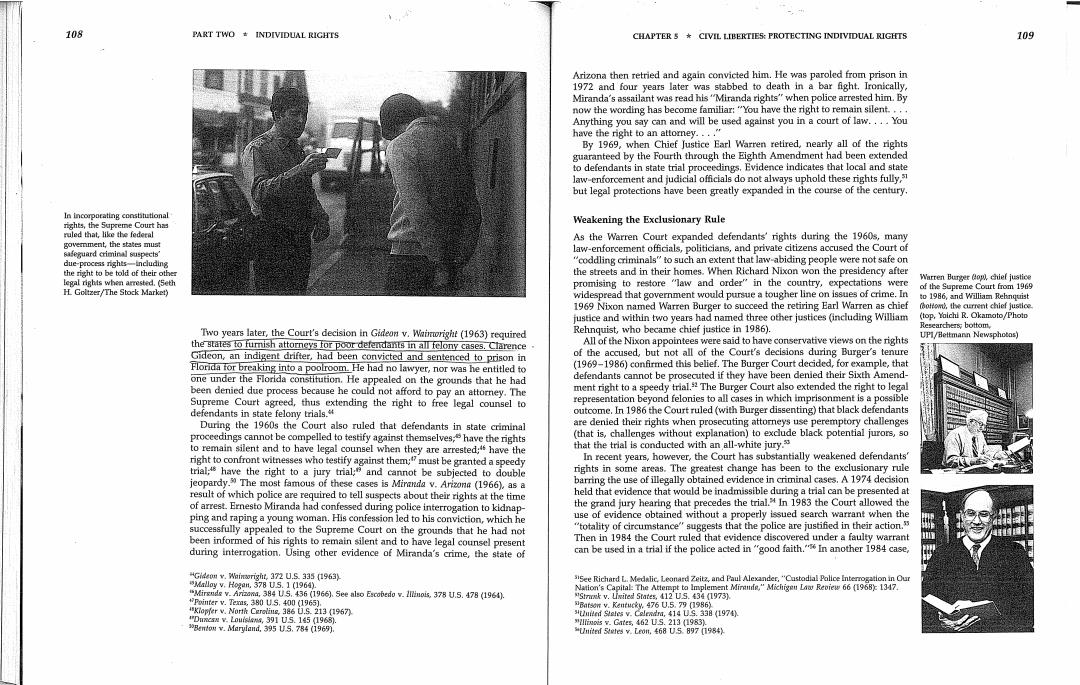正在加载图片...

,4 108 PART TWO*INDIVIDUAL RIGHTS CHAPTER 5*CIVIL LIBERTIES:PROTECTING INDIVIDUAL RIGHTS 109 Arizona then retried and again convicted him.He was paroled from prison in 1972 and four years later was stabbed to death in a bar fight.Ironically, Miranda's assailant was read his"Miranda rights"when police arrested him.By now the wording has become familiar:"You have the right to remain silent.. Anything you say can and will be used against you in a court of law....You have the right to an attorney.. By 1969,when Chief Justice Earl Warren retired,nearly all of the rights guaranteed by the Fourth through the Eighth Amendment had been extended to defendants in state trial proceedings.Evidence indicates that local and state law-enforcement and judicial officials do not always uphold these rights fully, but legal protections have been greatly expanded in the course of the century. In incorporating constitutional rights,the Supreme Court has Weakening the Exclusionary Rule ruled that,like the foderal As the Warren Court expanded defendants'rights during the 1960s,many owernment.the states mu分 8afeguard criminal suspects' law-enforcement officials,politicians,and private citizens accused the Court of "coddling criminals"to such an extent that law-abiding people were not safe on he the streets and in their homes.When Richard Nixon won the presidency after Irights wher d.(Seth promising to restore "law and order"in the country,expectations were n Burger (op),chief justice ne Court from 1969 widespread that government would pursue a tougher line on issues of crime.In o1986, 1969 Nixon named Warren Burger to succeed the retiring Earl Warren as chief fustice and within two years had named three other justices (including William (top,Yaichi R.Okamoto/Photo Researchers bottom, Two years later,the Court's decision in Gideon v.Waimoright (1963)required Rehnquist,who became chief justice in 1986). All of the Nixon appointees were said to have conservative views on the rights UP1/Hettmann Newsphotas) the states to furnish attorneys for poor defendants in all felony cases.Clarence. Gideon,an indigent drifter,had been convicted and sentenced to prison in of the accused,but not all of the Court's decisions during Burger's tenure Florida for breaking into a poolroom He had no lawyer,nor was he entitled to (1969-1986)confirmed this belief.The Burger Court decided,for example,that one under the Florida constitution.He appealed on the grounds that he had defendants cannot be prosecuted if they have been denied their Sixth Amend- been denied due process because he could not afford to pay an attorey.The ment right to a speedy trialThe Burger Court also extended the right to legal Supreme Court agreed,thus extending the right to free legal counsel to representation beyond felonies to all cases in which imprisonment is a possible defendants in state felony trials." outcome.In 1986 the Court ruled (with Burger dissenting)that black defendants During the 1960s the Court also ruled that defendants in state criminal are denied their rights when prosecuting attorneys use peremptory challenges proceedings cannot be compelled to testify against themselves,have the rights (that is,challenges without explanation)to exclude black potential jurors,so to remain sient and to have legal counsel when they are arrested;have the that the trial is conducted with an all-white jury. right to confront witnesses who testify against themmust be granted a speedy In recent years,however,the Court has substantially weakened defendants' trial,have the right to a jury trial and cannot be subjected to double rights in some areas.The greatest change has been to the exclusionary rule jeopardy.The most famous of these cases is Miranda v.Arizona (1966).as a barring the use of illegally obtained evidence in criminal cases.A 1974 decision result of which police are required to tell suspects about their rights at the time held that evidence that would be inadmissible during a trial can be presented at of arrest.Ernesto Miranda had confessed during police interrogation to kidnap- the grand jury hearing that precedes the trial.In 1983 the Court allowed the ping and raping a young woman.His confession led to his conviction,which he use of evidence obtained without a properly issued search warrant when the successfully appealed to the Supreme Court on the grounds that he had not "totaity of circumstance"suggests that the police are justified in their action. been informed of his rights to remain silent and to have legal counsel present Then in 1984 the Court ruled that evidence discovered under a faulty warrant during interrogation.Using other evidence of Miranda's crime,the state of can be used in a trial if the police acted in"good faith.In another 1984 case, 72U.s 33596) SSee Richard L Medslic.Leonard Zoitz,and Paul Alexander,"Castodial Police Inter ation in Our 0 W's Can ta The atie to Implement Mirande,"Michigeu Law Reoiew 66 (1968E 1347. (1966).See also Escobedo v.Iois,378 U.5.478 (1964). skV.1Rie5at年,412Us.434973) amv.entw.476U.5.79(0986M 31U5145 SUuited Stales v.Colexdra,414 U.S.338 (1974) .Maryland,395U5,784(196 "iw地.Cte5462Us.2131983). MUnited Stotes v.Leon,468 U.5.897 [1984)